The Reviews: Sondheim’s Company and Everybody’s Talking About Jamie, London UK
By Ross
 In London, surprisingly, one across the street from another, two very different birthday cakes are being served up nightly. One for a 34-year-old single female turning 35, and another for a young bleached blond boy turning 16 years old. Even over at the beautiful Noel Coward Theatre, a third birthday (and a second 35th) is being celebrated by a band of young New York gay men in the phenomenal The Inheritance. It’s a strange and funny coincidence that all three shows that I saw when visiting the West End over Thanksgiving weekend had a birthday within its structure, framing a personal development attached to age and advancement. A review for Matthew Lopez’s magnificent marathon play, The Inheritance will hopefully be coming soon, but for now, let’s take a closer look at the two musicals that I saw; Stephen Sondheim’s miraculous revival of Company and Dan Gillespie Sells and Tom MacRae’s Everybody’s Talking about Jamie as they revel in their individual birthdays, each in their own way, setting the developmental action into motion with deliberate finesse and agility. Impeccably, the two bring forth strong ideas of personal realization and growth and with candles blazing bright, the very different but fabulous shows give us all something quite special to sing about on the corner of London’s Rupert Street and Shaftesbury Avenue.
In London, surprisingly, one across the street from another, two very different birthday cakes are being served up nightly. One for a 34-year-old single female turning 35, and another for a young bleached blond boy turning 16 years old. Even over at the beautiful Noel Coward Theatre, a third birthday (and a second 35th) is being celebrated by a band of young New York gay men in the phenomenal The Inheritance. It’s a strange and funny coincidence that all three shows that I saw when visiting the West End over Thanksgiving weekend had a birthday within its structure, framing a personal development attached to age and advancement. A review for Matthew Lopez’s magnificent marathon play, The Inheritance will hopefully be coming soon, but for now, let’s take a closer look at the two musicals that I saw; Stephen Sondheim’s miraculous revival of Company and Dan Gillespie Sells and Tom MacRae’s Everybody’s Talking about Jamie as they revel in their individual birthdays, each in their own way, setting the developmental action into motion with deliberate finesse and agility. Impeccably, the two bring forth strong ideas of personal realization and growth and with candles blazing bright, the very different but fabulous shows give us all something quite special to sing about on the corner of London’s Rupert Street and Shaftesbury Avenue.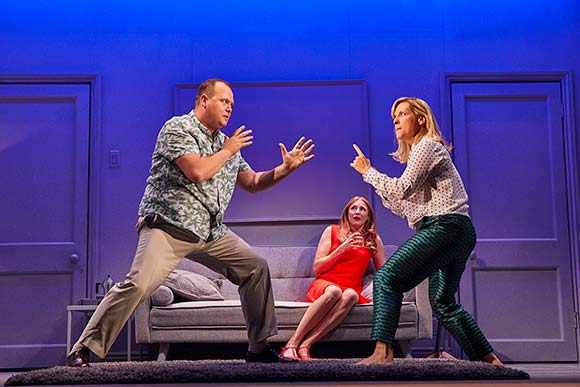
The main reason my November trip occurred in the first place began with the announcement that Sondheim’s Company was being revived in the West End and one of my all time favorites, Patti LuPone (Gypsy, Sweeney Todd) was going to play Joanne, a part made famous by Elaine Stritch back on Broadway in 1970. I’ve seen LuPone perform the famous, “The Ladies Who Lunch” when she sang as part of a red-dressed ladies giving celebration to Sondheim’s 80th birthday. LuPone wondrously sang the song with a sweet nod directly to Stritch’s red hat stating, “I’ll drink to that!” LuPone was also seen in the role opposite Neil Patrick Harris at the 2011 New York Philharmonic concert version, one I missed live but watched a live recording streamed from somewhere into my living room while cursing the world for allowing me to miss it. But here in London, directed with a wise and creative twist by Marianne Elliott (National’s Rules for Living, West End/Broadway’s Curious Incident…, Angels in America), I get a second chance. And boy, am I drinking to that (and sitting in my apartment in NYC, I hope one day to get a second round).

LuPone, phenomenal in one of the first West End shows I ever saw, Les Miserables, once said in an interview that she is only interested in doing revivals if there is a unique and creative vision or a different slant to look at the heart of the piece (not a direct quote), and in this London West End revival, Elliott certainly found a compelling argument for Lupone to jump on board with this alternative vantage point. Elliot’s Bobby, once beautifully played by the dashing Raul Esparza (I have a Raul Esparza story to tell regarding how Esparza’s understudy went on the matinée I went to see Company on my actual birthday) on Broadway back in 2006 at the Ethel Barrymore Theatre, is now reframed with a blessing and a bit of a rewrite from Sondheim. Bobby is now Bobbie, a thirty-four, turning thirty-five year old single female played meticulously well by the very talented Rosalie Craig (West End’s The Ferryman, National Theatre’s The Threepenny Opera). As with all previous Bobbys, this Bobbie finds it equally difficult to commit fully to a serious relationship, let alone the idea of marriage. It’s a compelling flip, ripe with possibilities and reformations. Originally titled Threes, Company delivers forth five married couples, all Bobbie’s closest of friends, although one now is a gay male couple (Jonathan Bailey as Jamie, Alex Gaumond as Paul). They each as a pair engage in a debate of sorts with Bobbie through vignettes in no particular chronological order about the beauty and ugly complications of marriage and partnership. Three of Bobbie’s lovers, all now male (George Balgden as PJ, Richard Fleeshman as Andy, Matthew Seadon-Young as Theo), also have something to say to Bobbie regarding her lack of commitment and engagement. It’s all happening on Bobbie’s thirty-fifth birthday, a surprise party no less, setting this epic and troubling whirlwind of thoughts in manically smart motion. It’s one of my favorite Sondheim pieces, and in this London revival, it expands into something even more relevant and timely than one could ever have hoped for or expected.
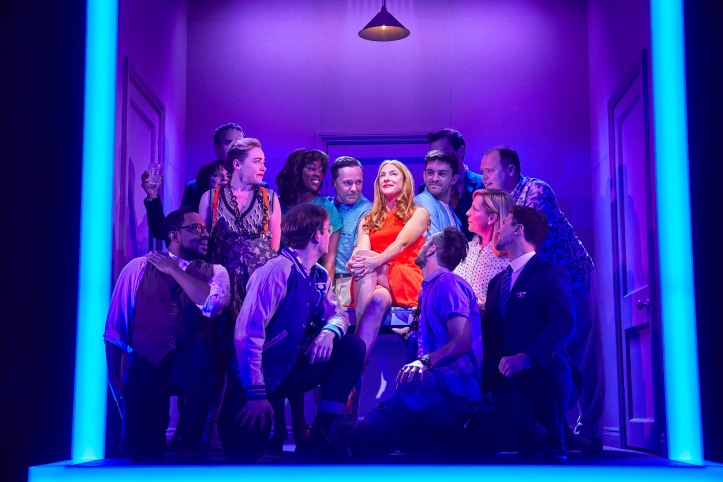
It’s a miraculous piece of writing and rewriting by composer Stephen Sondheim (Sweeney Todd), tweaking the lyrics and George Furth’s book to fit the flip, and one that fills my mind with wonder at Sondheim’s brilliance of re-construction and subtlety in story-telling, advancing the story with each delicious line after each delicious reading of a lyric or verse. The male partners shine with “Sorry-Grateful“, beautifully and elegantly performed by Gavin Spokes as Sarah’s Harry, Richard Henders as Jenny’s David, and Ben Lewis as Joanna’s Larry. It gracefully entwines around the song and the structure, courtesy of musical supervisor and conductor Joel Fram (Broadway’s Wicked), giving movement and emotional clarity to the devastating lyrics. Bobbie’s airline attendant boyfriend, Andy played to perfection by Richard Fleeshman (West End/Broadway’s Ghost), delivers their growing attachment with such depth and dimension. His male version of “dumb” April is delicate and fascinating, bringing an investment to his Andy that breathes simplicity and honor into the beautiful “Barcelona“, just as powerfully strong as Fleeshman’s chiseled abs and muscular physique. Wow, is all I can say.

LuPone’s Joanna strongly leads the couples through an exact and dramatically fun rendition of “The Little Things You Do Together“, and destroys the competition, if there is one, when LuPone gives us her newest version of “Ladies Who Lunch” that is unlike any other, including her own. It feels honest and heartfelt in a way that I haven’t heard before, and is deviously unique and compellingly detailed in thought and deconstruction. The whole cast clearly and wonderfully create versions of “Side by Side by Side” and the title song, “Company” that stick solid, but it’s all about the brilliant birthday girl Bobbie, when Craig beautifully delivers her Act One closer, “Marry Me a Little” and the breath-taking finale, “Being Alive“, tearing apart the house, almost, but not quite as well as Esparza did back in 2006.

How does it all go down with Bobbie being reassigned as a straight female? In many ways, it makes Company a more solid and contemporary piece of insightful musical theatre, deconstructing the limitations and preconceived notions that swirl around a 35-year-old single woman’s head. She should be married, thinking of starting a family, while keeping her career alive and her sexual body in shape, so some might say. It’s a lot to ask for from anyone, and might just be considerably more relevant than being a bachelor in 2018. Squeezed into the confined world of a single female’s dwelling, Bobbie and Company are thrillingly staged with style and precision by designer Bunny Christie’s (National’s The Red Barn) into a tight and claustrophobic sliding room life, most delicately lit by Neil Austin (Harry Potter…), with sound design by Ian Dickinson (National’s Hangman), and illusions by Chris Fisher. Bobbie’s sexuality remains entirely heterosexual and decidedly authentic, giving her freedom of choice and a particularly strong sense of self. In one particularly scenario, it makes her interactions with the young and handsome gay groom, Jamie (Jonathan Bailey), looking great in a pair of tight white pants who is freaking out most spectacularly in the most funny and brilliantly performed “Getting Married Today“, more beautifully realized and emotionally dense. It’s definitely, as it plays forward, far less creepy than then when Jamie is a female role, because when Bobbie suggests marriage between the two, it resonates on a far more authentic aura. And Bobbie is right, in a way, because if they do, everyone will just leave them alone and carry on as if the party had never ended. It’s a far more compelling connection being explored than when the male Bobby suggests the same to his best friend’s bride-to-be. That part just seemed a bit creepy and desperate. Beyond the more politically correct arrangement, Bailey’s performance shines incredibly bright in his well crafted earth-shattering melt-down performance, giving us one of the greatest Jamie’s ever, and one of the funniest serious deliveries I’ve seen. He self-destructs his way past his loving and patient partner Paul’s heart with the most hurtful statement on love and a politically vibrant and timely cry of “just because we can, doesn’t mean we should“. This scene and complicated engagement is when this Company and it’s Bobbie, gal pal to Jamie, leaps beyond the original into a stronger universe of understanding and meaning.
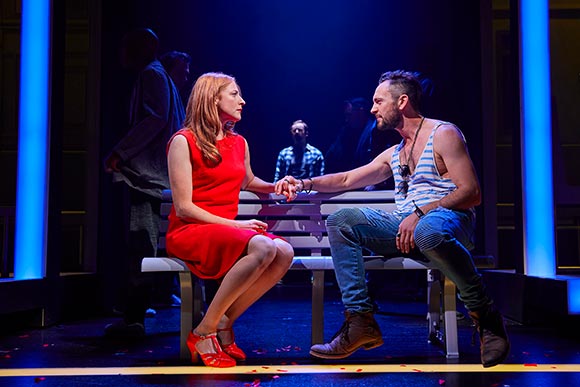
The main question that I had when walking into the Gielgud Theatre, was how they would walk the tightrope around Joanne’s final plot-twisting proposition to what she believes to be a relationship-phobic Bobbie. In the original, this rich wife and strong woman suggests that Bobby should become her kept-lover, but how would Joanne push Sondheim’s new female Bobbie to arrive at the astonishing realization and say the important line, “but who will I care for?” In pre-show discussions with other theatre junkies, I thought that Bobbie needed to be bisexual in nature for Joanne’s proposition to work, and it would, if they formulated Bobbie’s sexuality into something that is more fluid and bi-curious. That opportunity could reside with the feisty PJ, one of the more disconnected lovers of Bobbie, here portrayed by George Balgden (Theatre Royal’s Tartuffe). That part could have been played by a woman, giving Bobbie a more open sexuality that would allow a progressive Joanne to want to find her own brand of freedom in Bobbie’s bed. It could have been a compelling and fascinating exploration of power and sexuality in the modern world (and from what I hear through the grape-vine, it was suggested to LuPone more than once). And to be honest, although Blagden is fun in general as the narcissist PJ, his performance of the glorious song “Another Hundred People” is the weakest point in the generally strong production, which is amazing in itself as that song is one of the most fascinating and complex. It doesn’t really help that the choreography by Liam Steel (Shakespeare in the Park/Delacorte Theater’s Into the Woods) is distracting on both subway car sides of Blagden’s singing, but something just doesn’t fire up in that moment as it did when Angel Desai played Marta on Broadway alongside Raul. Overall, this is a strong and invigorating recreation of an epic piece of musical theatre, one that should be embraced for its inventiveness and bravado, especially in the very stupendously talented hands of LuPone, Craig, Bailey, Fleeshman, and Elliott, along with her company of actors and creatives.

Blowing out almost half of the candles that Bobbie tries to across the way, Everybody’s Talking About Jamie and its luminous star, John McCrea (Adelphi’s Peter Pan) are pushing forth an enlightened agenda that is just as surprising, mainly because it is being so wildly embraced and loved by the West End audiences that are filling the Apollo Theatre nightly. Strongly progressive and embracing, this heart-of-gold sweet musical, based on the documentary film “Jamie: Drag Queen at 16” straps on its signature red stilettos and dances forth the story of a young 15-year-old, going on 16, who dreams, most bravely, that one day he will become a well-known drag queen. It’s pretty amazing, especially in the casual way his dream is stated without an ounce of judgement coming from the smart and enlightened lyrics and book by Tom MacRae (Comedy Central’s ‘Threesome‘) and music and orchestrations by Dan Gillespie Sells (Soho Theatre’s The Bad, the Sad, and the Broken Hearted).

As directed with feisty fun by co-writer Jonathan Butterell (Broadway’s 2005 Tony Award winning Nine), Jamie busts forth, gleefully embracing his authentic self for all to see. With a strong visual presence, courtesy of designer Anna Fleischle (ATC’s Hangman) with straight-forward lighting Lucy Carter (Royal Ballet’s Chroma), strong sound design by Paul Groothuis (NT’s Follies) and fun video design work by Luke Halls (NT’s Ugly Lies the Bone), McCrea’ Jamie steals your glittery heart from the get-go with an ease that’s astounding. It’s heart-warming and progressive, especially in how the audience embraces the young lad with warmth and clarity. It’s also a fine bit of creation how his mother, played passionately by the wonderfully talented Rebecca McKinnis (Novello/Prince of Wales’ Mamma Mia!) and her BFF, Ray, brilliantly played just as powerfully by the magnificent Shobna Gulati (Victoria Wood’s ‘Dinnerladies‘) give strong support to this young man and his career choices. The nemesis, beyond the typical brutish father figure played well by Ken Christiansen (NT/West End’s An Inspector Calls), surprisingly comes in the form of guidance counselor/teacher Miss Hedge, played by the fabulous Michelle Viage (judge on ‘RuPaul’s Drag Race‘), who constructs a high and dangerous hurdle that young Jamie must find a way to leap past and over.

Beside Jamie’s mother who gets not one, but two powerful and compel songs, “If I Met Myself Again” and naturally, the dynamic “He’s My Boy”, the other highlight is Lucie Shorthouse (Soho Theatre’s Roller Diner) who plays Jamie’s best friend Pritti with a lovely kind presence and a killer voice that shines in her emotionally rich song, “It Means Beautiful“. It’s a gorgeous moment, courtesy of musical director Richard Weeden (UK’s 9 to 5) and musical supervisor Theo Jamieson (Savoy’s Funny Girl), blending the fun and the serious together with pleasure, even when there are moments that feel a bit forced and convoluted. With those two soldiers, Jamie and Pritti, arms linked in solidarity, the homophobic young student, Dean Paxton played strongly by the handsome Luke Baker (UK tour – Footloose) has no chance. Outnumbered and surrounded by the most liberal-minded fellow students one could imagine, Jamie power dances forward on the heels of choreographer Kate Prince (Novello’s Into The Woods), given a strong supportive boob boost by the retired but majestic former drag queen legend, Hugo Battersby aka Loco Chanelle, played joyfully by Lee Ross (West End’s Birdsong). One can’t help but get behind this brave boy, and want to help lift him up to where he belongs.
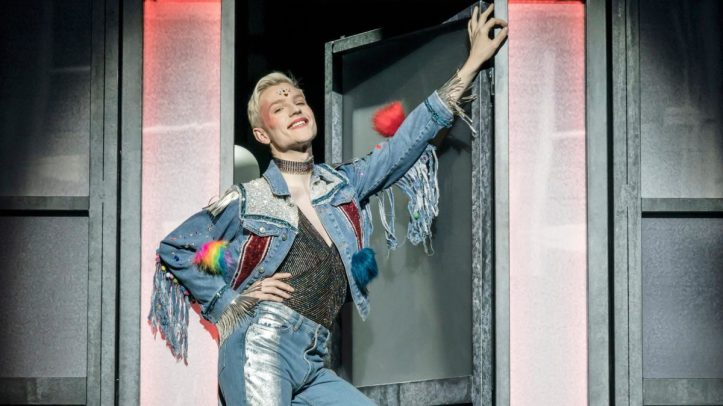
Everybody’s Talking About Jamie is not a perfect musical, never coming close to the brilliance of Sondheim and his Company. It still is in need of a bit of polishing and reformatting, but Jamie is just turning 16 years old, so he has plenty of time to perfect this sweet-natured progressive show, and I’m crossing my fingers they will. Company, on the other side of the road, with 35 candles glowing for the newly invented Bobbie is a masterpiece, and one so finely structured it can take on this re-imagining and shine just as bright. They are both fabulous musical comedies, on either sides of Rupert Street, worthy of their individual celebrations and battle cries for the future. Now let’s blow out those candles my dears, and make a wish. Just make sure you blow them all out in one go, or Joanne will have to remind you of the rules. I know what my wish is for both of these shows. I can’t tell you or my wish won’t come true…but I will say it has something to do with New York City and Broadway….

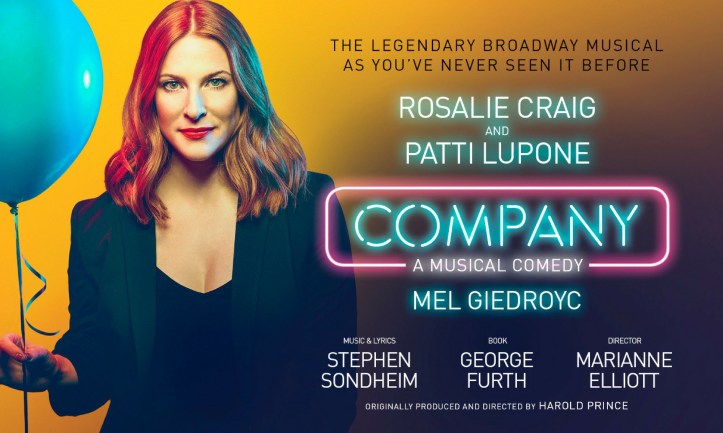
[…] friends at Eric’s 35th birthday party (another 35th, just like the marvelous Miss Bobbie at Company a few blocks away) that hits hard and wide, even when not exactly as embracing of all topics, […]
LikeLike
[…] is invited to this wondrous party as this production flies up high.” Full Review Company The cast of COMPANY “The main reason my November trip occurred in the first place began […]
LikeLike
[…] Stephen Sondheim and George Furth’s musical, Merrily We Roll Along is one of those legendary shows that many people are in constant awe of, including me. It dares to try something different by skewing the linear format with a reverse twist, confusing many, or intriguing a certain few. It starts with the ending, and ends with the start, and what is at the beating heart core is friendship; warts, martinis, and all. It premiered back on Broadway in 1981 and quickly closed after only a measly 16 performances and 52 previews. It keeps trying to find it’s perfect incarnation and soul mate, as the music, or at least some of the songs, are true blue Sondheim, complicated but exciting, digging in to interpersonal dynamics with a bravery and audacity that is powerfully intoxicating. Should the actors be older, and then play younger later on? Or should it be the other way around? These questions seem to swirl around it, with no one ever really figuring out the answer definitively. I’ve seen numerous attempts and try-outs. The one in 2012 at NYCC Encores! starred Lin Manuel Miranda (Charley), Celia Keenan-Bolger (Mary), and Colin Donnell (Franklin), and was my first real experience of this problematic show. I loved the confusion, and embraced the sentimentality. That production was followed close by London’s Menier Chocolate Factory‘s West End transfer in 2013 starring the glorious and delicious Jenna Russell, Mark Umbers, and Damian Humbley. It was a delight, and then went on to win the Peter Hepple Award for Best Musical at the Critics’ Circle Theatre Awards. […]
LikeLike
[…] of Follies, and, I’m proud to say, I had also already seen the other Sondheim masterpiece, Company starring Rosalie Craig and Patti LuPone (although I was very tempted to go see it again, especially […]
LikeLike
[…] of Follies, and, I’m proud to say, I had also already seen the other Sondheim masterpiece, Company starring Rosalie Craig and Patti LuPone (although I was very tempted to go see it again, […]
LikeLike
[…] acclaimed West End production of the Stephen Sondheim/George Furth musical, Company is returning to Broadway in all its ground-breaking glory as directed by Marianne Elliott […]
LikeLike
[…] 35th birthday party brunch (another 35th, just like the marvelous Miss Bobbie in Sondheilm’s Company that I saw in the same trip to London, and that will be gracing the Broadway stage this spring- Can […]
LikeLike
[…] America to sold-out shows. I mean, I don’t quite see it, but hey, if Sondheim can do it with Company. Why not, is all one can say. Years ago, I thought it might be Lea Michelle and the producer of […]
LikeLike
[…] again, and we easily feel his pain. Beautifully voiced by the debonaire Ben Lewis (West End’s Company), the sound is exquisite and rich, bursting forth with just enough tinting from the Phantom to make […]
LikeLike
[…] Rodriguez Kritzer. Patti LuPone also introduced the Founders Award for Excellence in Directing to Marianne Elliott during the 2020 Drama League Gratitude Awards last night. Voting is open for Drama League members […]
LikeLike
[…] all those women who should have had more power back then, Patti LuPone (West End/Broadway’s Company) plays with full-on gorgeousness the former silent movie star Avis Amberg. She is married to ACE […]
LikeLike
[…] the lineup features Tony winners Patti LuPone (Broadway’s War Paint, West End’s Company), Glenn Close (Broadway’s Sunset Boulevard), Nikki M. James (Broadway’s Les Misérables, […]
LikeLike
[…] and should never be lumped into the company of other relationship musicals, like the soon to arrive Company. But it does carry a certain kind of charm. It arrived onto the single person bar scene via […]
LikeLike
[…] legendary Sondheim musical that was being resurrected, reconfigured, and re-examined by director Marianne Elliott, was being staged, a show I was planning on seeing one week later, but, as a friend said to me the […]
LikeLike
[…] alongside the incredible Olivier Award winner Jonathan Bailey (West End’s Company) as the gay couple in the center of this battlefield ring, Cock stands up tall and strong for the […]
LikeLike
[…] for both of us, but it really was all about the Olivier Award winner Jonathan Bailey (West End’s Company) who elevated it all, as only a “Bridgerton” […]
LikeLike